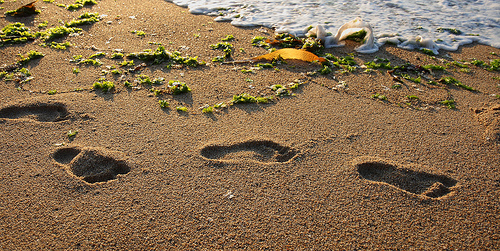What's the best thing to do to help the environment?

I live in the city. Every day I walk out of my apartment past garbage piled up and abandoned on a corner, wait at stoplights while an endless stream of cars chugs by spewing exhaust, and when I cross, I step over oil and tar stains on blacktop.
It's so much a part of the atmosphere that I don't even notice it. When I'm in the suburbs or the forest, I miss the noise and the grime. But the fact is, I know these things are harming the Earth, and I know that I'm part of a culture that not only condones but embraces and desires all of this-- and most of us don't think about what we can do on a day-to-day basis.
Before I moved to the city, I worked in the outdoors leading camping trips. Part of our curriculum was to teach something called "Leave No Trace" principles and to teach our students, often from the city and the suburbs, about ideas like sustainability and personal conservation.
We taught things like turning off the faucet when you brush your teeth, picking up even little bits of trash when you drop them and reusing water bottles rather than tossing disposable ones. We encountered a lot of argumentative resistance, but most people embraced the general idea. When we had discussions or debates about it, though, we usually ended up at the same point:
What can one person really do?
For an idea of our impact, I pulled these numbers from Green Options:
Americans: 44,000 lbs. = 20 tons of CO2 per year
Industrial Nations: 24,000 lbs. = 11 tons of CO2 per year
Worldwide: 8,750 lbs. = 4 tons of CO2 per year
I still turn off the water when I brush my teeth out of habit. It's a habit I taught myself and now I would never go back. But it's not the biggest impact I can make. These five things are, for the ultra-committed, the biggest things you can do to make an impact as one person.
1. Don't have kids: It sounds pretty harsh, right? Having kids is the reason a lot of people argue the human race exists for. If we're not here to make babies, what are we doing? A fair question. The fact is, though, the single largest thing any one person can reduce the massive amount of waste each of us creates in our lifetime is to choose not to create more life, thereby not creating any opportunity for more environmental damage. Think I sound crazy? Read this Forbes article from someone who is choosing not to have children for exactly this reason. The Sierra Club takes a softer approach, advocating for access to family planning around the world with an eye toward population control. Have we reached our carrying capacity?
2. Don't drive: This is a pretty Western world concern. America is a nation that worships the car. I grew up in a suburb, and I don't even think it would be possible to exist without a car. I sure didn't think it was. It was all I could think about until I turned 16, and then it was all I wanted to do. Green Options estimates that American cars produce 20 lbs of CO2 for each gallon of gasoline burned-- for every 100 gallons of gas we use we create 1 ton of greenhouse gas as CO2. That's pretty staggering-- and that's double the harmful CO2 as Japanese or European ones. These days, I choose to live where I can commute on public transportation or by bike to work specifically so I don't have to drive. It's good for the Earth and I think it's healthier for me. Of the five things on this list, this is really the only one I can claim to adhere to.
3. Don't fly: Cars are bad, but traveling by plane is by far the most negatively impactful thing we do as individuals. For a rough estimate, every 2,000 miles a person flies accounts for 1 ton of carbon emissions. That's a little more than a one way flight from L.A. to Atlanta. So, if you take a round trip plane flight anywhere in the United States, chances are you're generating a ton of CO2. If you fly a lot, you're well over average. Stop flying and you'll be way under average.
Alright, it's all very "Don't Do This, Don't Do That" so far, which may explain a bit about why people have such a hard time living a greener life, and why the environment is still hurting. Here are two action-oriented things you can do that make a huge difference on the environment:
4. Go vegetarian: Basically, what it takes to raise the meat that we eat is wreaking havoc on the environment through greenhouse gasses. Meat-based diets create 7x as many greenhouse-gas emissions as vegan diets. Animal agriculture is the single biggest source of methane emissions in the U.S. If every American skipped one meal of chicken and ate veg instead, the CO2 savings would be the equivalent of taking 500,000 cars off the road. The list goes on. Read more here. As a bonus, there's a large body of evidence that going vegetarian is a great health choice too.
5. Reuse everything: I don't have numbers for this, but the less you throw away, the less you pollute, and the less you're buying at the store, the less they are stocking, etc. As an individual, choosing to reuse Ziploc bags and use glass containers for other things, etc. has a huge impact. Try keeping all of the packaging you throw away in one place for a month and think about that times everyone in your neighborhood.
Image courtesy of John Loo via flickr

2 comments